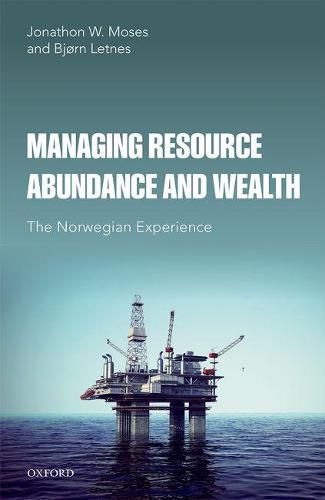Readings Newsletter
Become a Readings Member to make your shopping experience even easier.
Sign in or sign up for free!
You’re not far away from qualifying for FREE standard shipping within Australia
You’ve qualified for FREE standard shipping within Australia
The cart is loading…






Managing Resource Abundance and Wealth: The Norwegian Experience describes the sundry and significant challenges, both economic and political, facing petroleum-producing countries. The volume outlines the pitfalls that policymakers encounter in the aftermath of a major resource discovery, and what they can do to protect their countries from the most adverse consequences. These lessons are derived from two very different sources: The broader-if still underdeveloped-social science literature that examines the ‘Paradox of Plenty’ in its disparate forms; and the experience of a country that has successfully managed its natural resources over several decades. As a small country on the margins of Europe, Norway has stood up to powerful international interests in one of the world’s most powerful industries. Norway has exerted sovereign control over its natural environment, and exploited its resources in a way that has delivered significant wealth to its citizens. This volume explains how Norway has largely avoided the ‘Paradox of Plenty’. It aims to demonstrate the variety of policy tools that are available to states rich in natural resources, and how these tools can be adjusted to changing (domestic and international) contexts. It considers a number of questions, such as how countries need to administer and regulate the industry to consider the costs and benefits associated with various contract and licensing regimes, and fiscal arrangements; to maintain competitiveness and avoid becoming too dependent upon the sector; to maximize local content; and to protect the broader economy from the volatility of petroleum prices. The volume shows how the industry can be managed in a democratic, just, and ethical manner, and for the benefit of the general population.
$9.00 standard shipping within Australia
FREE standard shipping within Australia for orders over $100.00
Express & International shipping calculated at checkout
Managing Resource Abundance and Wealth: The Norwegian Experience describes the sundry and significant challenges, both economic and political, facing petroleum-producing countries. The volume outlines the pitfalls that policymakers encounter in the aftermath of a major resource discovery, and what they can do to protect their countries from the most adverse consequences. These lessons are derived from two very different sources: The broader-if still underdeveloped-social science literature that examines the ‘Paradox of Plenty’ in its disparate forms; and the experience of a country that has successfully managed its natural resources over several decades. As a small country on the margins of Europe, Norway has stood up to powerful international interests in one of the world’s most powerful industries. Norway has exerted sovereign control over its natural environment, and exploited its resources in a way that has delivered significant wealth to its citizens. This volume explains how Norway has largely avoided the ‘Paradox of Plenty’. It aims to demonstrate the variety of policy tools that are available to states rich in natural resources, and how these tools can be adjusted to changing (domestic and international) contexts. It considers a number of questions, such as how countries need to administer and regulate the industry to consider the costs and benefits associated with various contract and licensing regimes, and fiscal arrangements; to maintain competitiveness and avoid becoming too dependent upon the sector; to maximize local content; and to protect the broader economy from the volatility of petroleum prices. The volume shows how the industry can be managed in a democratic, just, and ethical manner, and for the benefit of the general population.